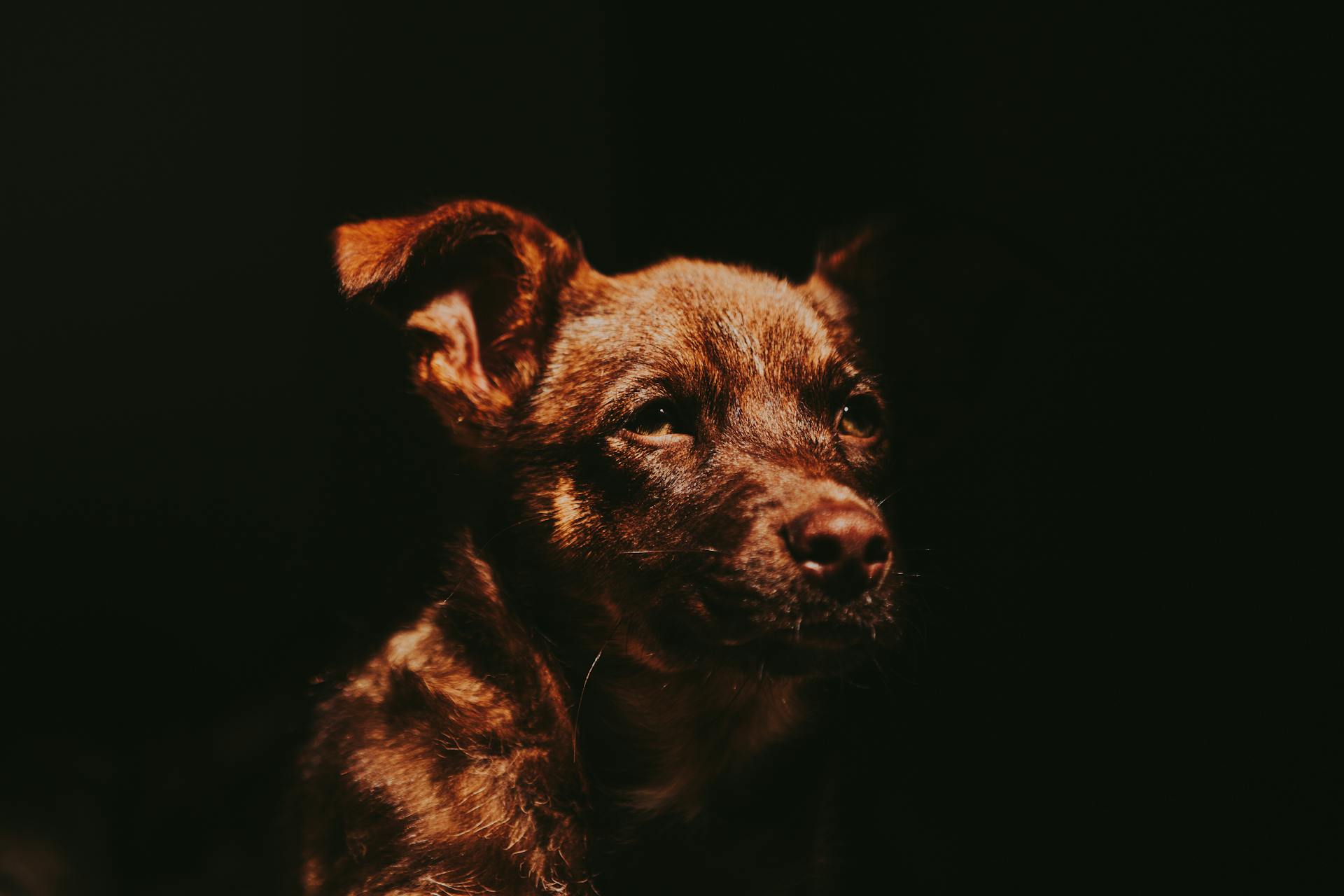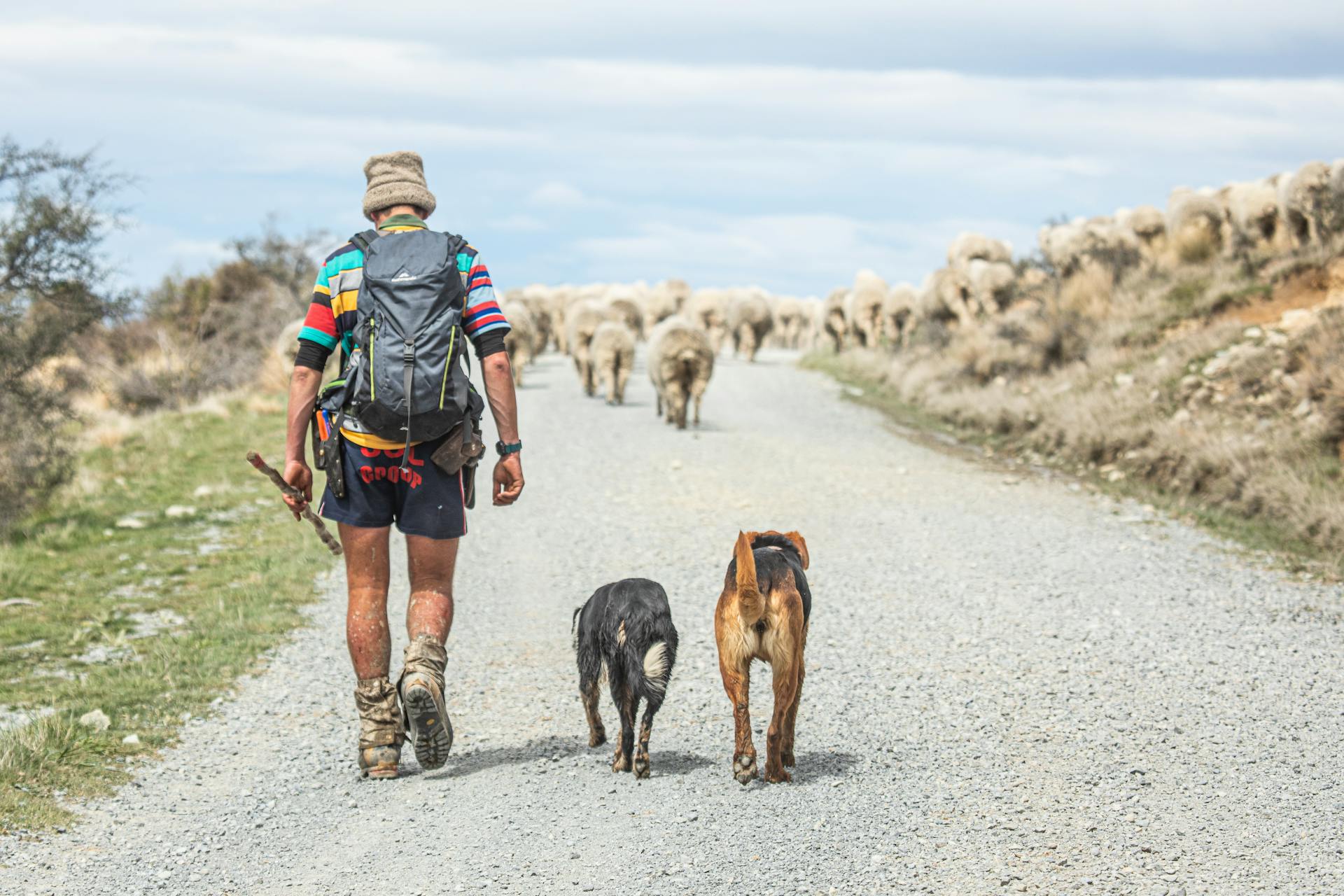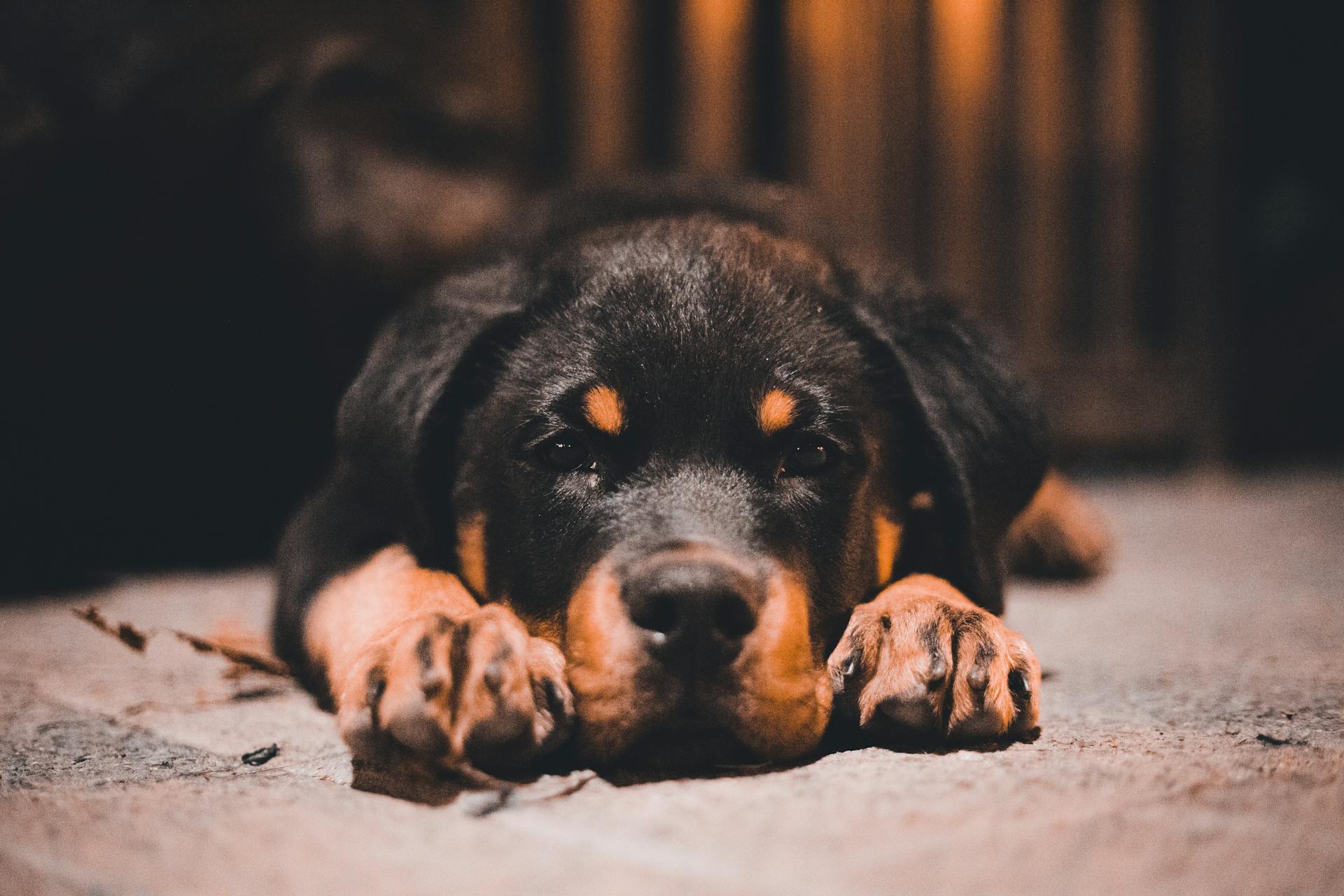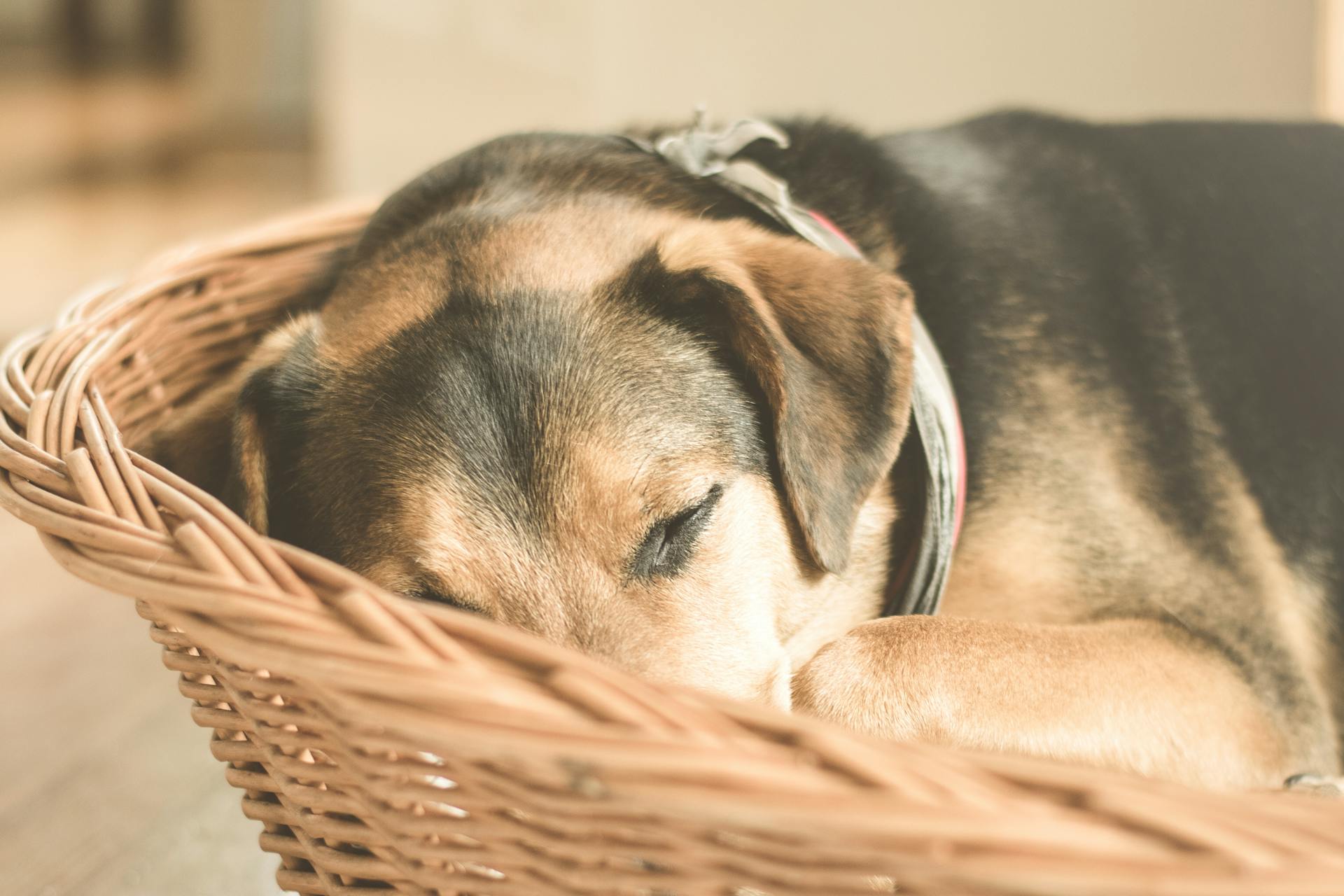
Big dogs require early socialization to prevent fear-based behaviors, which can be addressed by exposing them to various environments and people from an early age.
Housebreaking a big dog requires patience and consistency, as they have a large bladder capacity and can hold their urine for longer periods.
Consistency in training is key, as big dogs have a short attention span and may get distracted easily.
Positive reinforcement techniques, such as reward-based training, are effective for big dogs, as they thrive on praise and affection.
Establishing a routine and setting clear boundaries is essential for big dogs, as they can be strong-willed and independent.
For more insights, see: Healthy Mind Canine - Separation Anxiety Training
Training Basics
Reinforcement is key to learning, and it's not just humans who reinforce behaviors. Inadvertent environmental reinforcement can encourage unwanted behaviors, like helping yourself to food from the counter.
Not all reinforcement is positive, and ignoring unwanted behaviors can actually make them worse. For example, if you leave food on the counter and your big dog gets to it, he'll learn to look for food there again.
Readers also liked: What Is the Best Large Breed Dog Food
Basic good manners are essential for big dogs, and some behaviors are more critical than others. Polite leash walking is a must-have skill, as it allows you to control your dog in public and enjoy activities together.
A well-behaved dog is more likely to be invited to social events and outings. To teach polite leash walking, see our training tips from September 2021.
A good greeting is also important, as a big dog barging into someone's face can be overwhelming. Teaching your dog to sit politely when greeting people is a great way to show respect and consideration.
Some useful behaviors for big dogs include mat training, which helps manage their presence in social situations. Family members and visitors can relax knowing your dog will stay on his mat while you dine and socialize.
For mat training tips, see our article from January 2020. Another essential behavior is "walk away", which teaches your dog to quickly move away from potential trouble. This cue can be a lifesaver in situations where normal good manners aren't enough.
Here are some basic good manners that are particularly useful for big dogs:
- Polite leash walking
- Appropriate greeting
- Mat training
- Walk away
Breed-Specific Considerations
If you're considering bringing a big dog into your life, it's essential to know their unique needs and characteristics. Irish Wolfhounds, for instance, are known to be intelligent and fast learners, but they require regular exercise to keep them happy and healthy.
Irish Wolfhounds are also the world's tallest dog breed, so be prepared for a tall companion. Bernese Mountain Dogs, on the other hand, are usually very easy to train, but they do need significant amounts of daily exercise to prevent barking and uncooperativeness.
These large breeds also have high energy levels, so it's crucial to keep them busy and engaged to avoid boredom. Alaskan Malamutes, with their athletic and powerful frames, require similar attention to prevent destructive behavior.
A different take: It's Your Choice Dog Training
Standard Poodle
The Standard Poodle is regularly rated as one of the most intelligent and obedient large dog breeds.
One of the standout traits of Standard Poodles is their trainability - they're highly trainable and excel in obedience, agility, rally, and tricks.
Rottweiler
Rottweilers are generally easy to train, but they do need tasks to keep them happy and engaged.
This breed thrives on work and can excel in obedience, rally, and carting activities.
A Rottweiler's calm and confident nature makes them a great family dog, as long as they receive the right attention and stimulation.
With proper training and care, Rottweilers can be a wonderful addition to any family.
Worth a look: Family Dog Training
German Shepherd
The German Shepherd is an active and athletic large dog breed, both eager to please and ready to work.
They're natural born workers, with a history of serving in various roles, such as acting as guide dogs for the blind.
Their versatility makes them a great fit for many families, as they can also serve as good watchdogs and herding dogs.
With proper training, German Shepherds can thrive in a variety of environments and situations.
For your interest: Why Do Police Use German Shepherds
Boxer
Boxers are intelligent, trainable, and loyal dogs. They have a strong desire for human affection, particularly from children.
Boxers are a large, active breed that requires daily exercise. If you're an active person, a Boxer might be a great fit for you, as they love to stay on the go.
Their intelligence and trainability make them relatively easy to teach and train, but be prepared to keep them active with regular exercise to keep them happy and healthy.
Worth a look: How to Keep a Diaper on a Female Dog
Doberman Pinscher
If you're considering bringing a Doberman Pinscher into your family, you'll want to know that they're very intelligent and learn quickly. They're also athletic dogs that make loving companions.
However, it's essential to remember that Dobermans are very strong, so socialization in puppyhood is crucial to ensure they're well-mannered.
Leonberger
The Leonberger is a large, powerful purebred dog that's a great companion for active families. They're described by the AKC as "gentle, patient and playful", making them a wonderful addition to households with children.
These dogs are smart and eager to please their owner, which means they're relatively easy to train. They're generally calm, but they do need vigorous exercise at least once a day to stay happy and healthy.
Irish Wolfhound
The Irish Wolfhound is a breed that stands out for its impressive height, with the average dog reaching remarkable proportions.
They are the world's tallest dog breed, according to the AKC's Family Dog Program.
Irish Wolfhounds possess a calm, kind, and patient personality, making them a great fit for families.
Their intelligence and fast learning abilities mean they can quickly pick up commands and tasks, but they do require regular exercise to stay happy and healthy.
Worth a look: All Breed Dog Training
Bernese Mountain
The Bernese Mountain Dog is an affable large dog breed that's usually very easy to train. They're also mild-tempered and have an interest in outdoor activities.
This breed does require significant amounts of daily exercise, which is essential to prevent them from barking loudly or becoming uncooperative.
Their calm nature makes them a great companion for many families, but it's worth noting that they do need regular physical activity to stay happy and healthy.
Bearded Collie
If you're considering bringing a Bearded Collie into your family, you'll want to know that they were developed to herd sheep and cattle. This means they're highly trainable and can thrive as both family companions and working dogs.
Their intelligence makes them relatively easy to train, but they do require regular exercise and mental stimulation to prevent boredom. A bored Bearded Collie can get into trouble, so be prepared to keep them active and engaged.
Chinook
Chinooks are happy hiking companions. They're also natural athletes, excelling in agility and other dog sports. Their sensitive and gentle demeanor makes them a great fit for families with children. These dogs are particularly intelligent and eager to please, making them easy to train.
Hovawart
The Hovawart is a medium to large-sized strong German dog breed originally developed to guard and track.
Training a Hovawart requires commitment and consistency, especially considering their strong and stubborn personalities.
Hovawart owners should start training when their dogs are still young to establish good habits and prevent unwanted behaviors from developing.
Their strong will can make training challenging, but with patience and positive reinforcement, they can learn to obey commands and become loyal companions.
American Staffordshire Terrier
The American Staffordshire Terrier is a loving and affectionate animal.
These dogs are extremely easy to train due to their intelligence and eagerness to please their owners.
Their stocky frame and imposing strength may make them seem intimidating, but they're a gentle breed that makes great family pets.
With proper training and socialization, they can thrive in a variety of living situations, from apartments to homes with yards.
Belgian Tervuren
The Belgian Tervuren is widely thought of as the most elegant of the four Belgian sheepdogs. They're highly intelligent and athletic, making them versatile performers in various activities.
Their intelligence and athleticism make them well-suited for a range of activities.
Sources
- https://www.fenzidogsportsacademy.com/blog/handler-training-for-working-large-high-drive-dogs
- https://www.whole-dog-journal.com/training/training-big-dogs/
- https://www.fearfreehappyhomes.com/size-matters-how-to-safely-introduce-big-and-little-dogs/
- https://www.newsweek.com/large-dog-breeds-easy-train-akc-terrier-shepherd-1620447
- https://www.dogwatch.com/products/electronic-dog-training-collars/remote-trainers/bigleash-s-15-remote-trainer/
Featured Images: pexels.com


